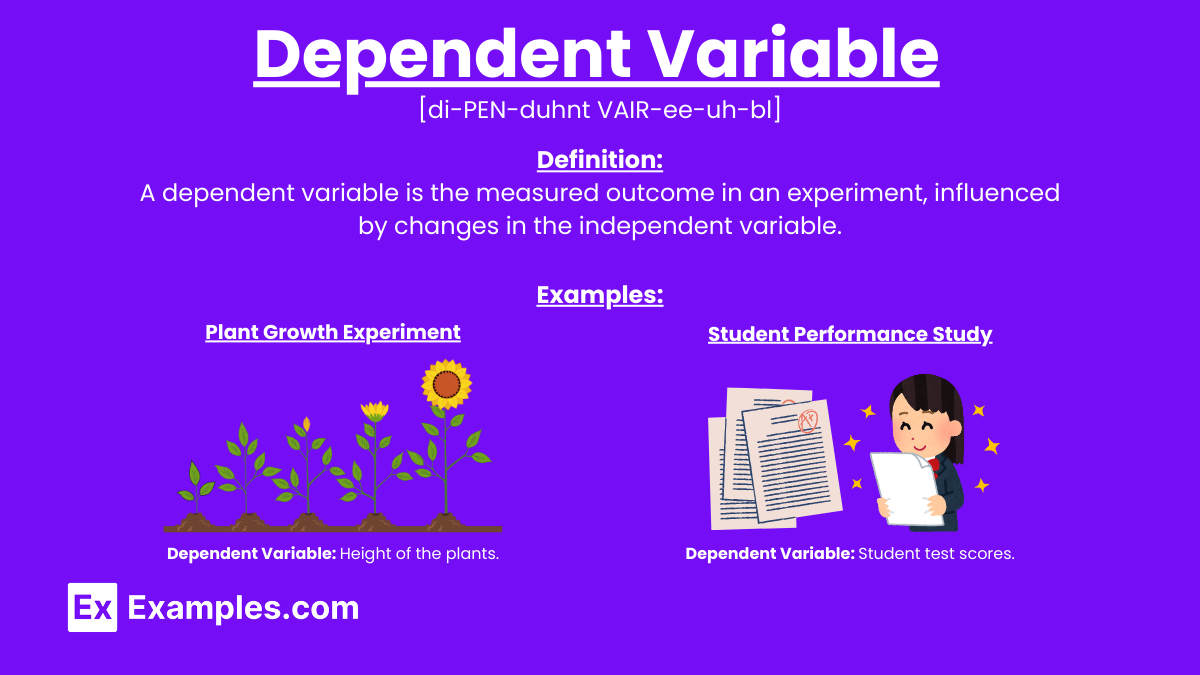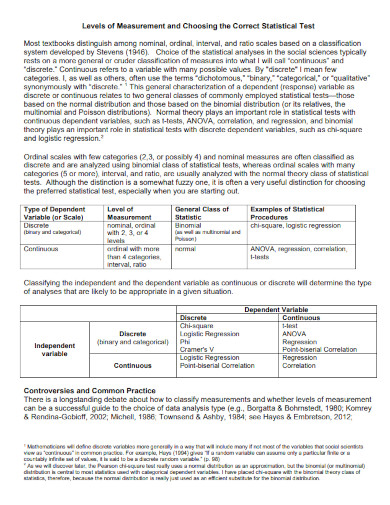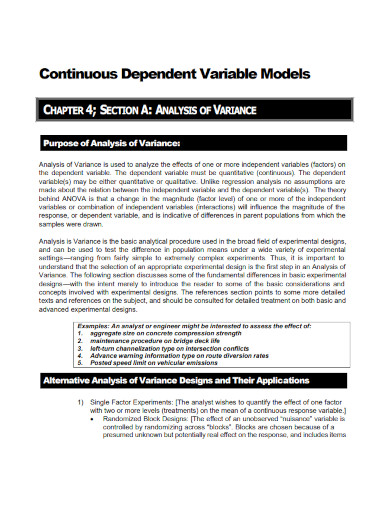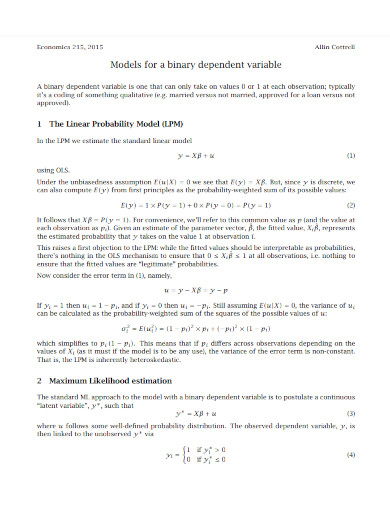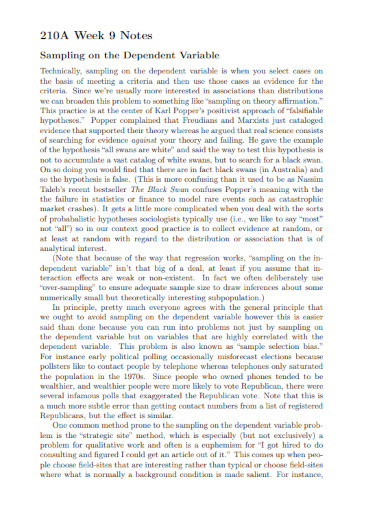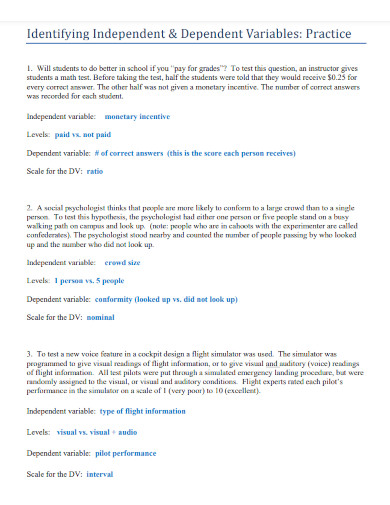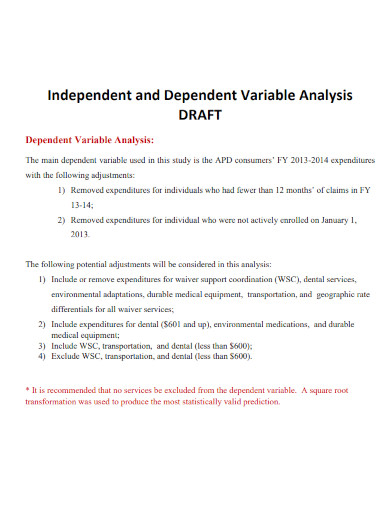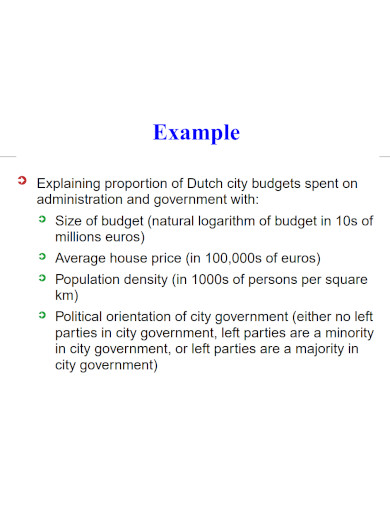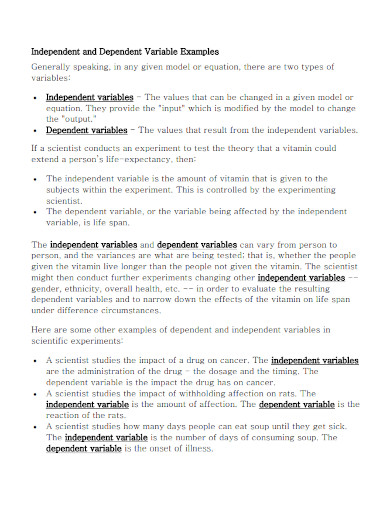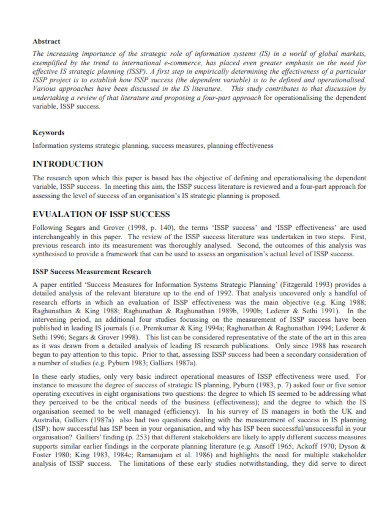70+ Dependent Variable Examples
A dependent variable is crucial in experiments and research, as it measures the effect of the independent variable’s manipulation. Researchers observe changes in the dependent variable to understand the relationship between variables. This observation helps in drawing conclusions about causality and effect. Essentially, the dependent variable provides valuable data that indicates how different factors influence outcomes in various scientific, social, and economic studies.
Every good research statement will need a well-grounded independent variable and a researched dependent variable. The dependent variable provides the main idea, context, theme, and tone of the research. This is one of the pivotal elements of the scientific method.
What Is a Dependent Variable
A dependent variable is a type of variable that refers to a specific element in a research statement. The relationship between the independent and dependent variables is the focal point of the research. The dependent variable will determine what research method you will use during the research proper. If the dependent variable creates an inductive topic, then the person will use qualitative research methods. If the topic requires the researcher to use deduction then they will use quantitative research methods. (see survey and survey questions)
Examples of Dependent Variable:
Dependent Variable Examples in Research
Here are examples of dependent variables in various research contexts:
1. Psychology
- Study: The effect of sleep deprivation on cognitive performance.
- Dependent Variable: Cognitive performance (measured by test scores, reaction times, memory recall).
2. Education
- Study: The impact of different teaching methods on student learning outcomes.
- Dependent Variable: Student learning outcomes (measured by exam scores, grades, comprehension levels).
3. Medicine
- Study: The effectiveness of a new drug in reducing blood pressure.
- Dependent Variable: Blood pressure levels (measured in mmHg).
4. Nutrition
- Study: The effect of a high-protein diet on weight loss.
- Dependent Variable: Weight loss (measured by the amount of weight lost in pounds or kilograms).
5. Sociology
- Study: The influence of social media usage on self-esteem.
- Dependent Variable: Self-esteem levels (measured by self-esteem scales or surveys).
6. Marketing
- Study: The impact of advertisement frequency on consumer purchase behavior.
- Dependent Variable: Consumer purchase behavior (measured by the number of purchases, purchase frequency).
7. Environmental Science
- Study: The effect of pollution levels on aquatic life health.
- Dependent Variable: Health of aquatic life (measured by population numbers, growth rates, mortality rates).
8. Economics
- Study: The impact of minimum wage increases on employment rates.
- Dependent Variable: Employment rates (measured by the percentage of employed individuals).
9. Engineering
- Study: The effect of material type on the durability of a product.
- Dependent Variable: Durability of the product (measured by lifespan, number of cycles to failure).
10. Public Health
- Study: The influence of vaccination programs on the incidence of infectious diseases.
- Dependent Variable: Incidence of infectious diseases (measured by the number of new cases reported).
Dependent Variable Example Sentences
Education:
- In a study on teaching methods, student test scores served as the dependent variable to measure the effectiveness of different instructional strategies.
Psychology:
- Researchers examined the impact of sleep deprivation on cognitive function by using scores on cognitive function tests as the dependent variable.
Medicine:
- The effectiveness of a new drug was assessed by measuring patients’ blood pressure levels, which acted as the dependent variable.
Marketing:
- To understand the influence of advertising on consumer behavior, the study tracked the number of products sold as the dependent variable.
Environmental Science:
- The impact of pollution on plant growth was evaluated by observing the height and health of plants, which were the dependent variables.
Sociology:
- The research on socioeconomic status and crime used crime rates in different socioeconomic groups as the dependent variable.
Sports Science:
- The effect of a training program on athletic performance was measured using athletes’ performance metrics (e.g., speed, strength) as the dependent variable.
Nutrition:
- In a study on dietary impact, the amount of weight lost by participants was the dependent variable to determine the effectiveness of a high-protein diet.
Economics:
- The influence of minimum wage increases on employment was assessed by analyzing employment rates in affected industries as the dependent variable.
Health:
- The study on exercise and mental health used scores on mental health assessments as the dependent variable to gauge the impact of physical activity.
Dependent Variable Examples in Psychology
1. Effect of Therapy on Anxiety Levels
- Dependent Variable: Anxiety scores on standardized anxiety assessment tests.
- Example Sentence: Researchers measured anxiety scores as the dependent variable to evaluate the effectiveness of cognitive-behavioral therapy.
2. Impact of Sleep Deprivation on Memory
- Dependent Variable: Performance on memory recall tests.
- Example Sentence: The study used performance on memory recall tests as the dependent variable to assess the effects of sleep deprivation.
3. Influence of Group Size on Social Loafing
- Dependent Variable: Amount of individual effort exerted in group tasks.
- Example Sentence: The dependent variable, amount of individual effort, was measured to study the influence of group size on social loafing.
4. Effect of Stress on Decision-Making
- Dependent Variable: Accuracy and speed of decisions made in a simulated task.
- Example Sentence: The accuracy and speed of decisions served as the dependent variable in the study of stress effects on decision-making.
5. Impact of Positive Reinforcement on Behavior Modification
- Dependent Variable: Frequency of desired behavior.
- Example Sentence: The study tracked the frequency of desired behavior as the dependent variable to understand the impact of positive reinforcement.
6. Influence of Exercise on Mood
- Dependent Variable: Scores on mood assessment scales.
- Example Sentence: Researchers used scores on mood assessment scales as the dependent variable to evaluate how exercise influences mood.
7. Effect of Media Violence on Aggression
- Dependent Variable: Levels of aggressive behavior displayed.
- Example Sentence: The levels of aggressive behavior were measured as the dependent variable to determine the impact of media violence.
8. Role of Parental Involvement in Child Academic Performance
- Dependent Variable: Child’s grades or test scores.
- Example Sentence: The study examined child’s grades as the dependent variable to assess the role of parental involvement in academic performance.
9. Impact of Mindfulness Meditation on Stress Reduction
- Dependent Variable: Cortisol levels or self-reported stress levels.
- Example Sentence: Cortisol levels were used as the dependent variable to measure the impact of mindfulness meditation on stress reduction.
10. Influence of Peer Pressure on Risky Behavior
- Dependent Variable: Incidence of risky behaviors.
- Example Sentence: The research focused on the incidence of risky behaviors as the dependent variable to study the influence of peer pressure.
Dependent Variable Examples in Everyday life
Here are some examples of dependent variables in everyday life situations:
- Exercise and Fitness:
- “In her workout routine, the number of calories burned was the dependent variable influenced by the intensity and duration of the exercise.”
- Cooking and Baking:
- “The fluffiness of the cake was the dependent variable affected by the amount of baking powder used in the recipe.”
- Gardening:
- “The growth rate of the plants served as the dependent variable, depending on the amount of water and sunlight they received.”
- Studying:
- “In his study schedule, the test scores were the dependent variable affected by the hours spent studying each day.”
- Driving:
- “The fuel efficiency of the car, measured in miles per gallon, was the dependent variable influenced by driving speed and maintenance.”
- Sleeping:
- “The quality of sleep, assessed by restfulness in the morning, was the dependent variable impacted by the number of hours slept and bedtime routine.”
- Shopping:
- “The total cost of groceries was the dependent variable determined by the number of items purchased and their prices.”
- Dieting:
- “Weight loss over a month was the dependent variable influenced by caloric intake and exercise.”
- Work Performance:
- “Employee productivity, measured by tasks completed, was the dependent variable affected by work environment and job satisfaction.”
- Home Cleaning:
- “The cleanliness of the house, rated on a scale, was the dependent variable influenced by the frequency and duration of cleaning activities.”
Dependent Variable Examples in Science
1. Chemistry
- Dependent Variable: Reaction rate.
- Example Sentence: The reaction rate was measured to determine the effect of different catalysts on the chemical reaction.
2. Biology
- Dependent Variable: Growth rate of bacteria.
- Example Sentence: The study tracked the growth rate of bacteria to observe the impact of varying nutrient concentrations.
3. Physics
- Dependent Variable: Speed of an object.
- Example Sentence: The speed of the object was recorded to see how different surface textures affected motion.
4. Environmental Science
- Dependent Variable: Air quality index.
- Example Sentence: The air quality index was monitored to study the effects of industrial emissions on air pollution levels.
5. Medicine
- Dependent Variable: Patient recovery time.
- Example Sentence: The patient recovery time was analyzed to evaluate the effectiveness of a new surgical technique.
6. Astronomy
- Dependent Variable: Brightness of a star.
- Example Sentence: The brightness of the star was measured to study changes over time and understand stellar life cycles.
7. Psychology
- Dependent Variable: Response time in a cognitive test.
- Example Sentence: Researchers measured response time as the dependent variable to assess the impact of sleep deprivation on cognitive function.
8. Agriculture
- Dependent Variable: Crop yield.
- Example Sentence: The crop yield was evaluated to determine the effectiveness of a new fertilizer.
9. Geology
- Dependent Variable: Erosion rate.
- Example Sentence: The erosion rate of soil was measured to understand the impact of vegetation cover on soil stability.
10. Meteorology
- Dependent Variable: Temperature change.
- Example Sentence: The temperature change was recorded to analyze the effects of greenhouse gases on global warming.
Dependent Variable Examples in Sociology
1. Education Attainment
- Dependent Variable: Graduation rates.
- Example Sentence: The study analyzed graduation rates to determine the impact of socioeconomic status on educational attainment.
2. Crime and Deviance
- Dependent Variable: Crime rates.
- Example Sentence: Researchers measured crime rates to assess the influence of community policing on neighborhood safety.
3. Social Mobility
- Dependent Variable: Income levels.
- Example Sentence: The income levels of participants were tracked to study the effects of educational opportunities on social mobility.
4. Health Disparities
- Dependent Variable: Access to healthcare services.
- Example Sentence: The research examined access to healthcare services to understand the impact of racial and ethnic disparities.
5. Family Dynamics
- Dependent Variable: Divorce rates.
- Example Sentence: The study focused on divorce rates to explore the relationship between financial stress and marital stability.
6. Political Behavior
- Dependent Variable: Voter turnout.
- Example Sentence: Voter turnout was analyzed to investigate the effects of social media campaigns on political participation.
7. Social Networks
- Dependent Variable: Frequency of social interactions.
- Example Sentence: The research measured the frequency of social interactions to study the impact of urbanization on community bonds.
8. Employment
- Dependent Variable: Job satisfaction.
- Example Sentence: Job satisfaction levels were assessed to determine the influence of workplace diversity on employee morale.
9. Gender Studies
- Dependent Variable: Gender wage gap.
- Example Sentence: The gender wage gap was evaluated to analyze the effects of policy changes on salary equity between men and women.
10. Cultural Assimilation
- Dependent Variable: Cultural identity retention.
- Example Sentence: The study measured cultural identity retention to understand the impact of immigration policies on assimilation processes.
Dependent Variable Examples in Biology
1. Plant Growth
- Dependent Variable: Height of the plants.
- Example Sentence: The height of the plants was measured to study the effects of different soil types on plant growth.
2. Enzyme Activity
- Dependent Variable: Rate of reaction.
- Example Sentence: The rate of reaction was tracked to determine the effect of temperature on enzyme activity.
3. Genetic Expression
- Dependent Variable: Level of gene expression.
- Example Sentence: Researchers measured the level of gene expression to study the impact of environmental stress on gene activity.
4. Animal Behavior
- Dependent Variable: Frequency of specific behaviors.
- Example Sentence: The study observed the frequency of specific behaviors to analyze the effects of different stimuli on animal responses.
5. Photosynthesis Rate
- Dependent Variable: Amount of oxygen produced.
- Example Sentence: The amount of oxygen produced was recorded to assess the impact of light intensity on the rate of photosynthesis.
6. Cell Division
- Dependent Variable: Number of cells.
- Example Sentence: The number of cells was counted to evaluate the effect of nutrient availability on cell division.
7. Population Dynamics
- Dependent Variable: Population size.
- Example Sentence: The population size of the species was monitored to study the effects of predation and competition.
8. Respiration Rate
- Dependent Variable: Amount of carbon dioxide produced.
- Example Sentence: The amount of carbon dioxide produced was measured to investigate the impact of exercise on respiration rate in organisms.
9. Immune Response
- Dependent Variable: Antibody concentration.
- Example Sentence: The antibody concentration in the blood was analyzed to determine the effect of a vaccine on immune response.
10. Seed Germination
- Dependent Variable: Germination rate.
- Example Sentence: The germination rate of seeds was measured to understand the influence of temperature on seed viability.
More About Dependent Variable:
1. Type of Dependent Variable
2. Continuous Dependent Variable Models
3. Models for Binary Dependent Variable
4. Sampling on Dependent Variable
5. Identifying Independent & Dependent Variables
6. Independent and Dependent Variable Analysis Draft
7. Proportions as Dependent Variable
8. Independent and Dependent Variable Examples
9. Operationalising Dependent Variable
Features of Dependent Variable
The dependent variable, also known as the response variable, is the variable being tested and measured in an experiment or study. Here are key features of a dependent variable:
- Measurement:
- The dependent variable is the variable that researchers measure in an experiment.
- It is often quantified and can be represented by numerical values.
- Response:
- It is the variable that responds to changes or manipulations in the independent variable.
- It reflects the effect or outcome of the experimental manipulation.
- Dependence:
- The dependent variable depends on the independent variable.
- Its changes are presumed to be caused by changes in the independent variable.
- Observation:
- It is the variable observed for changes during the experiment.
- Researchers collect data on the dependent variable to analyze the effects of the independent variable.
- Variability:
- It can vary based on different conditions or treatments applied to the independent variable.
- The degree of variability in the dependent variable helps in determining the strength of the relationship between variables.
- Operational Definition:
- The dependent variable must be clearly defined in operational terms, specifying how it will be measured.
- This ensures consistency and reliability in the measurement process.
- Statistical Analysis:
- Statistical methods are used to analyze changes in the dependent variable.
- Analysis helps in understanding the significance and impact of the independent variable on the dependent variable.
- Outcome:
- It is the primary focus of the hypothesis or research question.
- The dependent variable’s outcomes provide insights into the research findings.
- Control:
- Researchers must control extraneous variables that might influence the dependent variable to ensure valid results.
- Proper controls help in isolating the effect of the independent variable on the dependent variable.
How to Choose a Dependent Variable
1. Align with Research Objectives
Ensure the dependent variable directly relates to the main goals and objectives of your research question or hypothesis.
2. Measureability
Choose a variable that can be easily quantified or observed, allowing for accurate data collection and analysis.
3. Relevance
Select a variable that is relevant to the study and provides meaningful insights into the relationship between the independent and dependent variables.
4. Sensitivity to Changes
The dependent variable should be sensitive enough to reflect changes caused by manipulating the independent variable.
5. Consistency and Reliability
Ensure the variable can be measured consistently across different trials and by different observers, ensuring reliable data.
6. Practicality
Consider the feasibility of measuring the variable within the constraints of time, resources, and available technology.
7. Ethical Considerations
Ensure that measuring the dependent variable does not pose ethical concerns, particularly when dealing with human or animal subjects.
8. Previous Research
Review existing literature to understand what variables have been used in similar studies and their effectiveness in providing valuable data.
9. Define Clear Criteria
Establish clear, specific criteria for what constitutes a change or effect in the dependent variable to maintain objectivity.
10. Pilot Testing
Conduct preliminary tests to ensure the chosen dependent variable effectively captures the data needed for your study.
Dependent Variable vs. Independent Variable
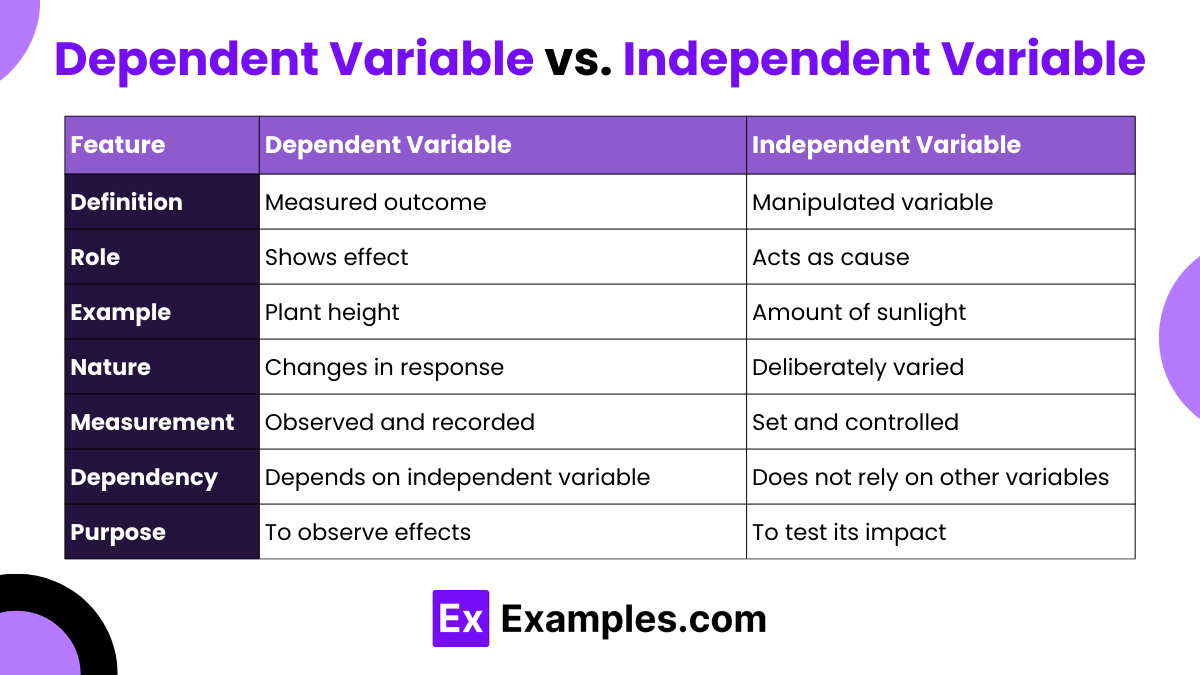
| Feature | Dependent Variable | Independent Variable |
|---|---|---|
| Definition | The variable that is measured or observed | The variable that is manipulated or controlled |
| Role in Experiment | Shows the effect or outcome | Acts as the cause or influencer |
| Change | Changes in response to the independent variable | Deliberately changed or varied by the researcher |
| Measurement | Outcome of the experiment | Input or treatment applied in the experiment |
| Example | Plant growth height | Amount of sunlight |
| Dependency | Depends on the independent variable | Independent, not affected by other variables |
| Purpose | To observe and measure the effect | To test its effect on the dependent variable |
| Hypothesis Relation | Used to test the hypothesis | Used to formulate the hypothesis |
| Data Type | Typically quantitative but can be qualitative | Typically categorical or quantitative |
| Analysis Focus | Results and outcomes of experiments | Factors or conditions being tested |
What is a dependent variable?
A dependent variable is the variable that is measured or observed in an experiment to assess the effect of changes in the independent variable.
How is a dependent variable different from an independent variable?
The dependent variable is the outcome measured, while the independent variable is the one manipulated to observe its effect on the dependent variable.
Why is the dependent variable important?
The dependent variable provides data that helps researchers understand the relationship between different variables and test their hypotheses.
How do you identify a dependent variable in a study?
Identify what is being measured or observed in response to changes in the independent variable to determine the dependent variable.
Can there be more than one dependent variable in an experiment?
Yes, an experiment can have multiple dependent variables to measure different outcomes or aspects of the same effect.
What are some examples of dependent variables?
Examples include test scores in education studies, plant height in botany experiments, and reaction time in psychological tests.
How is the dependent variable measured?
The dependent variable is measured using various methods such as surveys, tests, observations, or scientific instruments, depending on the study.
What role does the dependent variable play in hypothesis testing?
It helps test the hypothesis by showing whether changes in the independent variable produce significant effects.
How should a dependent variable be defined?
It should be defined clearly and specifically, ensuring it can be accurately measured and observed throughout the experiment.
What are common challenges in measuring dependent variables?
Challenges include ensuring reliability and validity, controlling extraneous variables, and accurately interpreting the data collected.



